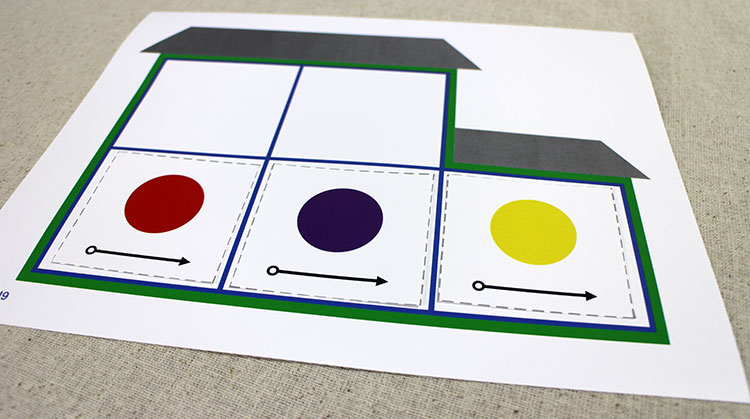J9: Snap or Snip: Last Sound
1. Overview
Count the sounds in two spoken words and determine which one has more sounds. This game is a combination of the previous Snap It On and Snip It Off Last Sound games. NOTE: This activity is about counting and ordering the sounds in words. It is not about spelling!
J9: Snap or Snip: Last Sound
2. Materials
Print out the word list, mats and sound counting cards, preferably on sturdy card-stock paper. Cut apart the sound counting cards. The word list is for the adult’s reference only. Set both mats in front of the child, with the sound counting cards next to them. ↑ Top3. Activity
Video: How to play Snap or Snip: Last Sound
Explain to your child that you will say two words, and his job is to count the sounds in each word and decide which has more sounds, the first word or the last word.
Adult: Listen to the two words I say. Then repeat them and count the sounds you hear in each word. If you hear more sounds in the first word, you will use the Snip windows [point to Snip it Off mat] so you can snip off a sound to make the last word in the bottom row. But, if you hear more sounds in the last word, you will use the Snap windows [point to Snap it On mat] so you can snap on a sound to make the last word in the bottom row.Now guide your child through a round of the game:
Adult: Let me show you what I mean. Listen to my two words: row, road. Again: row, road. Now say and count the sounds in row. Child: rrr – ōōō. Two sounds! Adult: Yes, row has two sounds. How many sounds does road have? Say it and count the sounds you say. Child: rrr – ōōō – d. Three sounds!Now the child must judge which of the two words has more sounds.
Adult: Since row was my first word, do you need to snap a sound on to row or snip a sound off of row to make road? Child: Um…I don’t know. Snip off? [This is the wrong answer, but let him figure it out for himself.] Adult: Okay, use your Snip windows to see if you’re right. Use the sound counting cards to fill in the top row with the sounds you hear in row. Child: rrr – ōōō. Uh-oh. I have a extra window. Adult: Well, try putting the cards in the Snap windows and see if they fit there. Use the sound counting cards to fill in the top row with the sounds you hear in row. Child: rrr – ōōō. They fit! Adult: Good! My second word was road. Say road and count the sounds you hear in the bottom row of windows. Child: rrr – ōōō – d. Three sounds, and three windows! Adult: So, you needed to snap on a sound to row to make road? Child: Yes! Adult: What sound did you snap on to row to make road? Child: d Adult: Right. Use a new sound card for d, and bring the cards for rrr and ōōō down from the top row of windows to the bottom row.Review and reinforce the child’s choices to snip or snap, and to change a sound at the beginning or end of the word, to be sure she understands the concepts.
Adult: Look at the house where you put your sound counting cards. Did the snip or the snap windows work with these words? Child: The snap windows. Adult: Why? Child: Because I had to snap a sound onto row to make road! Adult: Yes! Now tell me where you snapped on the sound — at the beginning of row or at the end of row? Child: Um… Adult: Did you say road, or dro? Child: road Adult: Where is that d sound — at the beginning or end of road? Child: At the end! Adult: Good job!Go through five to ten word pairs in a session. Be sure to mix up the order, so that sometimes the longer word is first, and sometimes the shorter word is first.
NOTE: A line above a vowel (for example, ā) indicates that it is the “long” vowel sound, which is the same as the vowel’s name.
↑ Top4. Confidence Builder
- Use only words with continuant consonant sounds (e.g., sail, name, zone).
- Use just four word pairs in a session, and repeat them in random order until the child shows mastery of the concept.
5. Extension
As the child gets more confident in this activity, have her try it without using the mats. Have her use only the sound counting cards to make the first word, and then snap or snip by adding or removing a card to make the second word. ↑ Top6. Small Groups (2-5 children)
Lesson Objective: Using manipulatives and counting mats for visual aids, children will hear, count, and correctly sequence the phonemes in two spoken words to determine which word has more phonemes. GELDS (Georgia Early Learning & Development Standards): CLL6.4f Georgia Standards of Excellence: ELAGSEKRF2.e Common Core State Standards: CCSS.ELA-LITERACY.RF.K.2.E Additional Materials:- enough work mats and sound counting cards for each child
- optional: pocket chart (for displaying work mats and sound counting cards)
- For each round of the game, select a different child to be your “echo” and repeat your two words to the group. Have that child confirm or correct the group’s work.
- Say a pair of words from the word list (varying which is said first, the three-sound or two-sound word). Ask the children to respond by saying “Snap!” or “Snip!” to describe how to change the first word to the second word you said. Be sure they aren’t just guessing at the answer! Make them “prove” their responses by saying and counting the phonemes they heard in each word.

